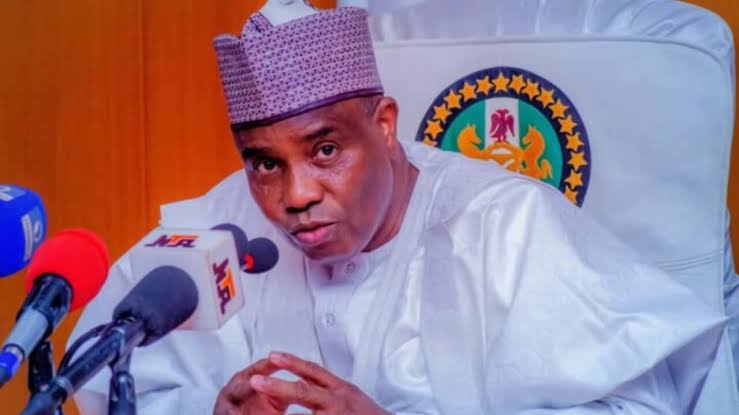No National Consensus to Unseat Tinubu in 2027, Says Lagos APC, Amid Opposition Push
By Elena Vasquez, International Correspondent
September 8, 2025
LAGOS, Nigeria – The Lagos State chapter of the All Progressives Congress (APC) has firmly rejected claims of a “national consensus” to unseat President Bola Ahmed Tinubu in the 2027 Nigerian general elections, branding the narrative a “failed attempt to rewrite the obvious truth.” The statement, issued by APC spokesman Seye Oladejo on September 7, 2025, responds to former Sokoto State Governor Aminu Tambuwal’s assertion that a broad coalition is forming to oust Tinubu. As political tensions rise, the debate underscores Nigeria’s polarized landscape, with implications for the nation’s economic and democratic trajectory.
Tambuwal’s Claim and APC’s Rebuttal
Tambuwal, a Peoples Democratic Party (PDP) chieftain and senator representing Sokoto South, declared on Channels Television’s Politics Today on September 5, 2025, that efforts to defeat Tinubu represent a “national consensus” rather than a northern conspiracy. “I am fully involved in a process—democratically and lawfully—that will end, by the grace of God, in sending this government out of office,” he stated, accusing Tinubu’s administration of failing to meet expectations. Tambuwal emphasized a united opposition, citing figures like Peter Obi, Atiku Abubakar, and Rabiu Musa Kwankwaso, but noted that a fragmented opposition would favor Tinubu.
Oladejo dismissed Tambuwal’s claims as “laughable” and a “smokescreen for political irrelevance.” In a statement reported by Vanguard News, he argued that Nigerians overwhelmingly supported Tinubu in 2023 and continue to back his “Renewed Hope Agenda,” which he claims is stabilizing the economy and creating jobs. “What is emerging is a national consensus to support good governance, and when the time comes in 2027, Nigerians will not hesitate to reaffirm their trust in a leader who delivers,” Oladejo said. He took a swipe at Tambuwal, suggesting he focus on clearing his name amid anti-graft agency investigations.
Political Context and Economic Challenges
Tinubu, elected in February 2023 with 8.79 million votes, has faced significant criticism over economic policies, including fuel subsidy removal and naira devaluation, which have driven inflation and hardship. A post on X by @SamuelOmogor on August 27, 2025, cited a Nigerian Bar Association conference where attendees “almost unanimously” agreed Nigeria is worse off than two years ago, reflecting public discontent. Tambuwal’s coalition, led by the African Democratic Congress (ADC), aims to capitalize on this, with support from figures like Obi and Aregbesola, though he insists it’s not regionally driven.
The APC counters that Tinubu’s reforms are yielding results, pointing to infrastructure projects and economic stabilization efforts. Osita Okechukwu, a founding APC member, told Daily Post on September 7 that Tinubu retains a “huge chunk” of former President Muhammadu Buhari’s 12 million vote-bank, bolstered by the North-South rotation convention established in 1999. “The truism is that the majority of Nigerians adopted the national consensus for equity, justice, and fairness,” Okechukwu said, dismissing opposition claims as driven by “desperate power grabbers.”
Expert and Public Perspectives
Political analyst Dr. Chidi Amuta, speaking to The Guardian, cautioned that Tambuwal’s coalition faces challenges due to “incompatible ambitions” among opposition leaders like Obi, Atiku, and Kwankwaso. “It will be a cold day in hell before they concede to one another,” he said, echoing Oladejo’s mockery of an “elusive alliance sabotaged by greed.” Public sentiment on X is mixed, with some supporting Tambuwal’s push—“Tinubu’s policies are choking us. Time for change!”—while others back the APC, noting, “No coalition can match Tinubu’s track record.”
The controversy mirrors global debates on leadership accountability, similar to Nigerian banking customers’ demands for transparency from the CBN, as reported by Punch Newspapers. The opposition’s success hinges on unity, a hurdle given past failures to consolidate against Tinubu in 2023.
Impact and Next Steps
Tambuwal’s call for a coalition signals an intensifying battle for 2027, but the APC’s confidence, backed by regional loyalty and Buhari’s voter base, poses a formidable challenge. The opposition must overcome internal divisions and articulate a clear alternative to Tinubu’s agenda. Meanwhile, the APC is focusing on governance, with Oladejo touting ongoing reforms. “While the opposition plays musical chairs, we are building roads, creating jobs, fixing power,” he said.
The CBN and BCAN could play a role in addressing economic grievances fueling opposition sentiment, as public frustration with financial burdens like bank charges parallels dissatisfaction with governance. Political rallies and coalition talks are expected to ramp up, with Tambuwal yet to name his preferred candidate, promising clarity once aspirants declare.
Conclusion
The Lagos APC’s rejection of a “national consensus” to unseat President Tinubu highlights Nigeria’s polarized political landscape as 2027 looms. Tambuwal’s ambitious coalition faces steep challenges, while Tinubu’s camp bets on governance and voter loyalty. For Nigerians, the debate is a call to weigh leadership against promises, ensuring the nation’s future aligns with its aspirations for equity and progress.
Sources: Vanguard News, Naija News, The Guardian, Daily Post, Pulse Nigeria, The Cable, X posts
